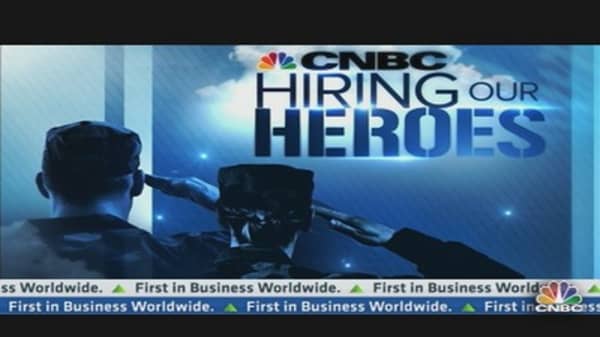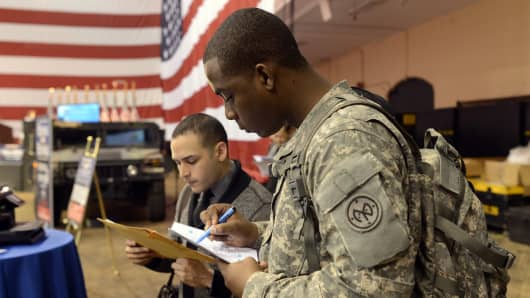"We see big companies across America making commitments," said "Hiring Our Heroes" Executive Director Kevin Schmiegel, a Marine veteran.
(Read More: Good News: Longer Workweek Could Mean More Jobs Coming)
Wall Street is deeply involved.
Citigroup hired 800 veterans in 2012. For Wells Fargo, it was more than 1,000. JPMorgan Chase has hired more than 5,000 U.S. veterans since 2011.
"They've been coming in mid-level management roles," said Citi's Suni Harford at Wednesday's "Hiring Our Heroes" job fair in New York City. "We have not done a lot of the entry level stuff, though that's our next goal because 50 percent of Citi's hires don't require a college education."
Citi's plan is to hire 1,000 veterans EVERY year.
"As things pick up (in the economy), we'll continue to build on that," Harford said.
(Read More: How Important Is a College 'Pedigree?')
However, Schmiegel of "Hiring Our Heroes" said, it's small businesses that will carry them to the 500,000 mark.
"We need THE engine in America—27 million small businesses— to hire veterans and military spouses," he said. "Once they hire one, they will hire a second and a third.
"This is not charity. This is about connecting talented people who have served our country with demands in the private sector."
Wednesday's job fair showcased the incredible range of veterans, from ex-officers with advanced degrees to under-25 year olds who don't even know how to write a resume or access the GI Bill education benefit.
"When I fist came home, it was overwhelming," said Owen Finnegan, a Marine veteran who now works at Capital One. "I didn't know what I was going to do next."
He had been home a few months last year and heard about a job fair on the East Coast. He hopped on a plane, interviewed with Capital One, and now, he's working for them in Virginia.
(Read More: Least Stressful Jobs for 2013)
But even for Finnegan, a degree-holding officer with a definite direction, the process of transition from military to civilian life was daunting.
"It's a massive life transition," he said. "It's not just a career change."
"To go from something that is your whole life (active military duty) to becoming just a regular person with a job is a massively scary thing."
But Finnegan did it.
And the hope is that he's the template for hundreds of thousands more who risked their lives for this country.
—By CNBC's Brian Shactman; Follow him on Twitter: @bshactman




